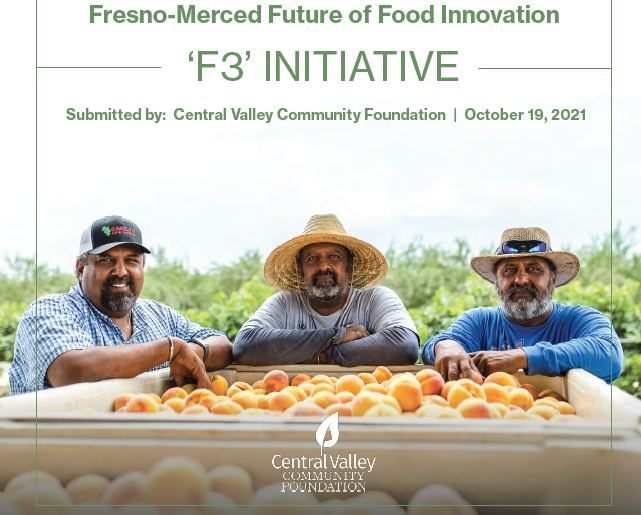
The F3 initiative is being spearheaded by the Central Valley Community Foundation. CVCF image
Written by Gabriel Dillard
A local coalition in the running for $100 million in federal dollars aims to create a new agricultural innovation industrial cluster for the Central Valley.
The Fresno-Merced Future of Food (F3) Initiative is one of 60 finalists for the U.S. Economic Development Administration’s (EDA) $1 billion “Build Back Better Regional Challenge.” As a finalist chosen from a pool of 529 applicants, The F3 initiative will receive a $500,000 seed grant with hopes to compete for up to $100 million from the program referred to in a news release as “the marquee of EDA’s American Rescue Plan programs.
The F3 Initiative is being spearheaded by the Central Valley Community Foundation with a coalition that includes the City of Fresno, Merced Community College, Fresno Metro Ministry and the Fresno Area Hispanic Foundation.. The goal of the industrial cluster is to “develop advanced, sustainable food production and food manufacturing.”
“The coalition proposes to address racial economic disparity, improve educational outcomes, and reinvest in underdeveloped neighborhoods by focusing on bringing small food entrepreneurs to the global food industry and expanding engineering capabilities in digitalization, equipment, and systems integration,” according to a description on the eda.gov website.
The project will help create and fill 10,000 jobs and upskill the region’s food systems workforce to earn an average of 40% more income, according to the proposal.
F3 Initiative component projects would include the Innovation Center for Research and Entrepreneurship in Ag Food Technology & Engineering (iCREATE). Located in Downtown Fresno near the future high-speed rail station in a renovated 45,000 square-foot building, iCREATE will serve as a physical headquarters for F3.
The “Hecho en Fresno” Downtown Hub is a $4.5 million project of Fresno Metro Ministry that would include a center for food entrepreneurs and farmers of color to access the global food industry and a satellite facility with St. Rest Baptist Church for its food distribution programs.
Another project, the “Opportunity Trail,” would fund a 1-mile, landscaped, lighted pedestrian trail connecting Southwest Fresno to downtown and the high-speed rail station. It is expected to increase trail capacity in the district by 65% and reduce vehicles miles traveled by 10,517 annually. That project is being led by Fresno Mayor Jerry Dyer’s administration.
Other projects would expand the education pipeline for workers in agrifood tech and engineering fields and make available loans for small businesses including mobile food vendors, food truck operators, restaurateurs and farmers.
Finalists will now compete for Phase 2 of the Challenge, which will award 20-30 regional coalitions up to $100 million to implement 3-8 projects that support an industry sector. The deadline for Phase 2 is March 15, 2022.
Finalists’ projects span 45 states and Puerto Rico.
“The Build Back Better Regional Challenge aims to supercharge local economies and increase American competitiveness around the globe,” said Secretary of Commerce Gina M. Raimondo. “The outpouring of interest in this program shows the demand for the Build Back Better agenda and the desire to not only create good-paying jobs, but also strengthen our country’s economic resiliency for years down the road.”







